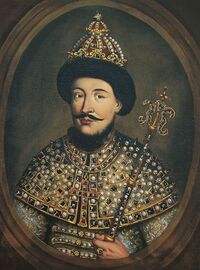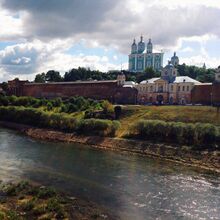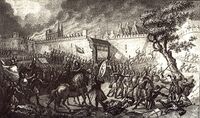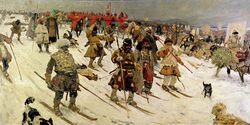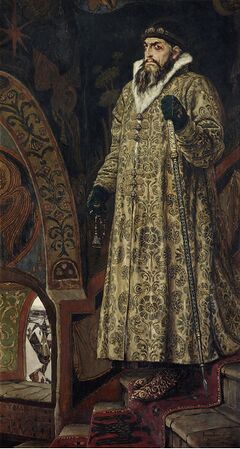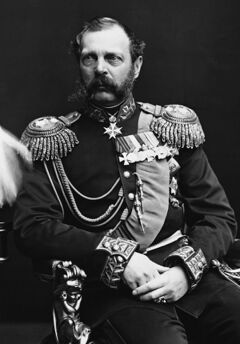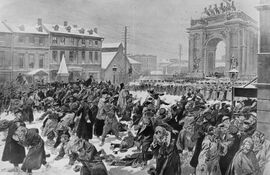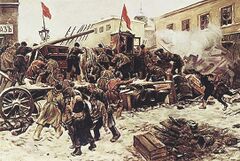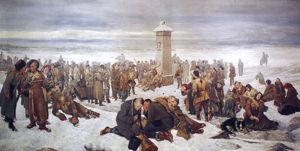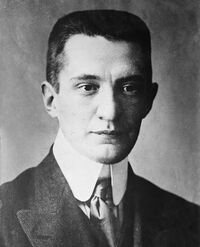Yugobatania
This article is incomplete because it is pending further input from participants, or it is a work-in-progress by one author. Please comment on this article's talk page to share your input, comments and questions. Note: To contribute to this article, you may need to seek help from the author(s) of this page. |
Greater Conglomerate of Yugobatania Большой Конгломерат Югобатании Bol'shoy Konglomerat Yugobatanii | |
|---|---|
|
Flag | |
| Motto: "Magis quam humanus humanus" | |
| Anthem: "Ratne Igre" (Yubontian) "War Games" | |
 Area formerly controlled by Yugobatania, highlighted in green | |
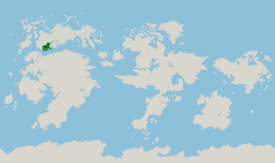 Area formerly controlled by Yugobatania, highlighted in green | |
| Capital and largest city | Vielo |
| Official languages | Yugobatanian, English |
| Demonym(s) | Yugobatanian |
| Government | Corporatocracy |
| Mark O | |
| Yelchkin Severosky | |
| Establishment | |
• Holy Tsardom of Yubontia formed | 1520 |
• The Vielo Uprise | 1847 |
• Yubontia coup d'état | 1921 |
• The Kingdom of Yugobatania forms | 1921 |
• The Second Overthrow | 1922 |
• The Federal Republic of Yugobatania forms | 1922 |
• The Winter Coup | 2013 |
• The Solomon Dictatorship is established | 2013 |
• The Third Death | 2016 |
• The Greater Conglomerate of Yugobatania forms | 2016 |
• The Great Fall | 2020 |
| Area | |
• Total | 853,454.744 km2 (329,520.719 sq mi) |
| Population | |
• 2019 estimate | 1,073 billion |
• 2014 census | 354,720,003 |
• Density | 244.4/km2 (633.0/sq mi) |
| GDP (PPP) | 2018 estimate |
• Total | $3.75 billion |
• Per capita | $19,664 |
| GDP (nominal) | 2018 estimate |
• Total | $4.37 billion |
• Per capita | $23,739 |
| Gini (2013 (est.)) | 30.8 medium |
| HDI | very high |
| Currency | E-Brin (Ƀ) (YUG) |
| Time zone | UTC-7 to -6 |
| Date format | dd/mm/yyyy |
| Driving side | left |
| Calling code | +273 |
| ISO 3166 code | YU |
| Internet TLD | .yu |
| Today part of | Italo-Yugo Kuromatsunai Austro-Hungarian Slavia Railroad-Crossing |
Yugobatania (Yugobatanian: Юговатаниа), officially the Greater Conglomerate of Yugobatania (Yugobatanian: Большой Конгломерат Югобатании romanized: Bol'shoy Konglomerat Yugobatanii), was a corporatocracy and minor power in Strangereal, formerly located on the continent of Verusa.
Yugobatania encompassed a small portion of the continent's northwestern landmass, and was bordered by Puczovska to the north, with Itallitopia to the east; Friently and the Sawtooth Badlands to the south across the Tsyemny Sea; along with a number of other countries to the south-southwest on the continent of Anea. Its capital, Vielo, was located within the Grand Yugo Region, the westernmost and largest of the former National Region System used by Yugobatania until 2016. Other major cities included Port Rione, Obierka, Motzy, Urula, and Kreb-Nout.
The former area known today as Yugobatania was once inhabited during the prehistoric period. Evidence of Neo-Verusan and Neo-Aneanus cultures have been found scattered throughout the country, mostly in the Wuson Region on the Eastern side of Yugobatania. The most widely accepted theory is the Tsyemny Migration Theory, which dictates that prehistoric species of the Neo-Aneanus race migrated across the continent of Anea from the south to Verusa, as the sea levels were very high, leaving a small land bridge which connected the two continents around 15,000 years ago. Various nomadic tribes inhabited areas around Yugobatania and Verusa. Very few cities were established, and those that were had small populations, and scattered across the country, mainly around the 8th to 3rd Centuries BCE. Kreb-Nout is the most ancient city in Yugobatania, being one of the first large and highly cultured cities, around the 6th Century BCE. Numerous cultural advancements were made in the 2nd and 1st Centuries of Yugobatania's history, with some of the first Yugobatanian written language being developed, as well as the creation of the first primitive texts and stories on papyrus, and eventually paper.
Yubontia, Yugobatania's predecessor, was formed in 1520. It was the first time in Yugobatanian history that an attempt for a unified country had been tried and succeeded (all other previous attempts had failed). Yubontia first established itself as a theocracy, with highly religious views around the monotheistic religion of Divinity. Around the 1700s, the country gradually turned into an absolute monarchy under King Joergen Versden I. A rich history and unique culture arose from Yubontia, with small amounts of its influence still seen in today's modern society. Numerous civil wars plagued Yubontia for most of its history after that due to a vast amount of social reform movements that the public frequently made, as well as the abuse of power that the Versden Royal Family had over its citizens. Civil revolts, such the Vielo Uprise in 1847, were some of the major factors that eventually led to Yubontia being overthrown in 1921, through the Yubontia coup d'état.
Yugobatania in the modern day was a highly developed nation that possessed a large population, a highly industrialized economy, and a well-outfitted military force. The country was also regarded for its many advancements in aerospace technology, robotics, advancements in artificial intelligence, as well as its highly advanced exoskeleton systems developed by OCorp, the governing body and largest megacorporation, in Yugobatania. Controversy had arisen in recent years after OCorp's rise to power, due to their use of highly dangerous chemical agents, violations of basic human rights, accusations of terrorist attacks and state-sponsored terrorism, illegal scientific undertakings, as well as criticism towards its form of government.
Despite large tax rates, as well as issues concerning basic human rights and needs, Yugobatania continued to rank very high in measures of socioeconomic performance, including average wage, median income, human development, per capita GDP, and worker productivity. The medium-sized, corrupt, yet well-organized government juggled the competing demands from its National Defense Sector, the Yugobatanian National Education Division, and general industrial businesses, mostly in military applications and various science sectors. Average income was an impressive 164,089 E-Brins, but there was a large disparity between incomes, with the richest 10% of citizens earning 846,599 per year while the poor average 17,325, a ratio of 48.9 to 1.
After an economic and political crisis in the early 2000's and the rise of ultranationalism within the country, the Supreme President of Yugobatania was disposed in 2013 during the Winter Coup. After the United Yugobatanian Front seized power in 2013, a dictatorship was established, leading to the Circum-Cision War and the eventual disposition of Solomon, which came to be called The Third Death. Shortly afterwards, O Corporations seized control of Yugobatania in 2016. Amidst an increase in war reparations, resource and economical shortages, and an increased hostility towards OCorp, Yugobatania dissolved in 2020. After the dissolution, the countries of Italo-Yugo, Kuromatsunai, Austro-Hungarian Slavia, and Railroad Crossing occupied the former lands of Yugobatania, which they still occupy at the present.
Etymology
The concept of "Yugobatania" has its origins in the Vielo Uprise, a violent revolt against the Versden's rule, that led to hundreds of deaths of protesters by the Yubontian monarchy. The name is a portmanteau of two words in the native Yugobatanian language, "jyugo" (South) and "vatani" (Literally "deviant" or "defiant").
"Vatani" was a derogatory term in Yubontia to describe citizens who would not follow societal norms, and disobey civil laws and ideas. This term gained a more positive connotation after the Vielo Uprise, as an act of defiance against the Yubontian government. Evidence from newspapers during the 1800's show that citizens began to show opposition to the government, and the word "Vatani" was mentioned frequently in articles about civil disobedience.
The usage of the term "jyugo", which means south, has given way to disputes in recent etymological studies upon the origin of Yugobatania's name. There is very little evidence that the word "jyugo" was mentioned, or even used, at all, in the process of creating Yugobatania. A few news reports have been found that show a possible origin of the usage of the word, that could have given its popularity. A story titled Южные рейдеры Цемненского моря (Southern Raiders of the Tsyemny Sea) written in 1851 by a relatively unknown writer named Truman Rosden was seen as the possible origin of the name. It tells the tale of a band of pirates in the Tsyemny Sea who traveled and had adventures throughout Verusa and Anea. Southern Raiders of the Tsyemny Sea showed underlying themes of patriotism and a desire to be free from tyranny, which was a common feeling that Yubontian citizens felt under the Versden's rule.
After the Universal Strangereal Language (USL) was adopted in 1905, "Jyugovatania" turned into "Yugobatania" through rough translation, as well as Yubontia's lack and general refusal to adopt the USL. The rough translation has stuck ever since, and occasionally the original native version of the countries name can be found throughout, most notably around older and less developed portions of the country.
History
Pre-history
The area is known today as Yugobatania was inhabited throughout the prehistoric period. Fossils of Homo-Verusus dating to the middle Palaeolithic period have been unearthed in Eastern Yugobtania, near the Wuson Region. Through efforts of DNA matching going back thousands of years, anthropologists have discovered that most inhabitants of Verusa have similar DNA of those in Anea, thereby helping to further confirm the Tsyemny Migration Theory.
The most famous and the best-presented site is Kreb-Nout, a major city in the modern-day. Remnants of several Homo-Verusus and Homo-Aneanus cultures were found in all regions of the country. The largest proportion of the sites is in the Grand Yugo Region. The Iron Age left traces of the early Yusonian culture and the Verusan Batania Nomad culture.
Early 20th century
Yubontia
The Holy Tsardom of Yubontia was established in 1520 after the gradual unification of the various city-states that existed in the region, under the rule of Tsar Oden Lavechnov, after the conquest of various Verusan tribes who had previously only been ununified. At the time, it was believed that the main population consisted of scattered city-states mainly inhabited by Verusan settlers. Constant raids and wars plagued the rival city-states, with much lesser cities either being absorbed or completely wiped out by bigger and more organized city-states. Yubontia had formed in the areas known today as the Grand Yugo Region and the Aisdorf Region. Yubontia had become a major power only forty years after it had officially formed, proving itself to be an influential political power among the other countries that were present in Verusa.
The most notable of these conflicts was the thirty-year long Yubontian-Wusony Wars, which would dominate the scene of Yubontian politics (especially in Vielo). The Yubontian-Wusony Wars were some of the first large scale conflicts seen on Verusa. The Duchy of Wusony was a duchy that had claimed independence in 1634, under the rule of Archivel Grovestky, Duke of Wusony. Yubontia did not officially recognize the Duchy, and thus sought to retake their former territory from Wusony. Yubontia officially declared war against Wusony in 1640, beginning the first of four wars in the Yubontian-Wusony Wars. These would define early Yubontian military tactics until the early years of Yugobatania's creation. The first war occurred in August of 1641, where little gains were made by either side, resulting in a stalemate that would last for eleven years. The fourth - and final - war occurred in late September of 1666, lasting for five years and seeing the defeat of the Duchy.
The Wusony forces were caught in an ambush near the Volushukev Pass, a narrow canyon near the Sural Mountains, a massive mountain range running from the Aisdorf Region and vertically up north towards the northern outreaches of Verusa. The narrow canyon allowed Yubontian cavalry to rush down the canyon walls, catching the Wusony forces off guard, severely weakening their military strength, and allowing Yubontia to mount a march towards the Wusony capital of Kreb-Nout two months later. This military march was known as the Yubontian Liberation March, and saw a movement of almost all of Yubontias forces, with a majority of the hordes comprised of horse-mounted cavalry.
Under the command of Alexy Vekahn, who was the current ruler of Yubontia at the time, they successfully sieged and captured Kreb-Nout on October 4, 1666. The siege lasted for four years, as the remaining Wusony forces mounted attacks to retake the city, which the Yubontian armies were successfully able to repel. Finally, in 1670, Alexy Vekahn mounted a final assault upon Archivel Grovestky's hideout, Broganov Kremlin, which is located in what today is the North Tice Region. Alexy and his forces were able to eliminate Archivel and the few remaining soldiers left of his army, officially ending the Yubontian-Wusony Wars on March 5th, 1670. Yubontia had successfully regained control of the country and annexed the former Duchy of Wusony back into its territory. Those that remained loyal to the Duchy were tried and prosecuted, with many Wusony loyalists escaping the country and going into exile.
The Vielo Uprise (1857-1863)
During the war, various reformist movements arose, calling for a reworking of the rigid caste systems and equal pay towards the lower class citizens. Many of these movements were largely ignored by the public or dealt with force by the Yubontian government. During the later years of Yubontia, economic crises and social reforms began to increase in frequency. The biggest civil revolt occurred in 1847, known today as the Vielo Uprise.
A large number of coal miners, farmhands, and various other low-class workers mounted a protest in the streets of Vielo demanding an increase in pay, better working conditions, as well as to have the Versden Royal Family abdicate the throne, due to massive and politically illegal abuses of power. The Versden Royal Family had a history of massive abuses of power towards the public ever since they took power in 1715. Hostility towards the Versdens increased, leading to an increase in capital punishments being enacted upon citizens.
A series of battles broke out among the populace that lasted for six years. On July 20, 1859, a large group of unarmed protestors gathered outside the gate of the Versden Royal Palace, demanding the Versdens to abdicate the throne. In response, Tsar Handel Versden III, who was the current ruler of Yubontia at the time, ordered the Yubontian Royal Guard to fire upon them, killing the majority of the protestors. This day came to be known as Bloody Wednesday. Three hours later, a large band of protestors and insurgents raided a large weapons cache in the Urula Prison, located in the Poznysev Region near the center of modern-day Yugobatania. From there, they were able to capture the prison and free prisoners who were arrested without cause or bail. They marched for two months towards Vielo, trading and shipping weapons through secret trade routes in between. These protestors, calling themselves the July Party, formed outside the Versden Royal Palace gates, in the same place as the Bloody Wednesday massacre. Once again, the Yubontian Royal Guards were sent to deal with them. Intense fighting took place in the streets, which ultimately ended in a stalemate, leaving both parties severely weakened. This further increased hatred between the two parties, and would lead to more frequent and violent attacks by the July Party.
Two years later, in 1861, the July Party attempted to siege Vielo and the Versden Royal Palace once again. The Yubontian Royal Guards engaged in fierce combat in the streets and even in the sewers, where some of the most bloody and intense fightings took place. After two years of conflict, the Yubontian Royal Army had successfully repelled most of the protestors and insurgents of the July Party. The few that did remain quickly disbanded and went into hiding, while those that were captured by the Royal Armies were tortured, exiled, or used as slave labor.
Intensive manhunts occured for the next four years, with various suspected civilians taken into prisons or used as slave labor. Modern historians believe that around 60,000 civilians were convicted of participating in the Vielo Uprise, with around 70% of those convicted being innocent. Citizens who harbored anything that was deemed illegal, or talked against the government were also convicted and forced to endure slave labor. Trust within the Versden Royal Family lowered among the populace. With a combination of more social and fiscal crises after the Vielo Uprise, secret groups and organizations that were against the Versen Royal Family formed. However, no large civil protests ever occured, with most of the political defiance being conducted through political posters and cartoons that portrayed the Versden Royal Family in humourous ways.
The Yubontia coup d'état (1921)
On November 10, 1921, the July Party amassed a large group of their supporters and arranged for a special legislative session to take place outside Vielo. At this point in time, the July Party had risen to become a serious political party, having some influence within the Yubontian government. The Versden Royal Family had still deemed them as an illicit political party, and July Party members were actively pursued by law enforcement. The chosen meeting place was within a small speakeasy called The Blind Tiger, which was opened in 1915. It was chosen, as according to a diary of one of the members present, "the speakeasy brewed the best vodka in the Grand Yugo Region, so it was an obvious choice for a meeting to be held within." Among the members present were two high-level government officials who supported the July Party's cause - General Ymir Dovetsky, a Yugobatanian general, member of the state and military councils, and Vladimir Poltirivich, a politician and member of the Yubontian Representative Legislature.


